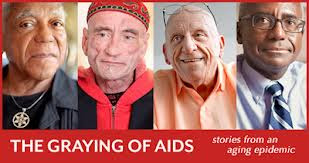No Place to call home: Aging with HIV/AIDS
By: Aaron M. Laxton, Blogger, Activist and HIV-Infected Queer
I remember once in a class that I was in the professor had the class address issues regarding their own mortality. For people in their youth this can be extremely hard since this can viewed as morbid. After all, we will live forever and nothing will ever hurt us...right? Obviously as we age we begin to understand that this is not the case; life is always moving and changing. Eventually life will move on and change without us.
HIV risk doesn’t stop at 50. In fact, men and women over age 50 account for 17 percent of all new HIV and AIDS diagnoses in the 40 states that have long-term confidential name-based reporting.
During the plague years hospices began to form that would address the needs of those dying from AIDS. It was in these hospices where patients were not viewed as an infectious disease but rather a person who needed love and compassion. A patient covered in Karposi Sarcoma or sufferingly was severe wasting was not feared but rather embraced, held and loved. Although the end of their life was marked by the extreme pain and suffering of AIDS related complications and social stigma, the hospice provided a safe-haven in their final days.
With the advent of improved medications and our understanding of our to treat HIV the amount of people dying from AIDS slowed; as a result the hospices that we once formed to provide support for them were not needed. It is estimated that approximately 50,000 annually die from AIDS in the United States. Some of these organizations restructured to provide other services and others simple were no longer there.
In 2009, people aged 50 and older accounted for 23% of AIDS diagnoses in the United States. Yet older adults are often overlooked in the ongoing HIV/AIDS conversation. Developed for the National Aging Network and others interested in educating older adults, the U.S. Administration on Aging HIV: Know the Risks. Get the Facts. Older Adults and HIV/AIDS Toolkit contains helpful resources and materials specifically designed to inform older adults about the risks of HIV/AIDS and to encourage older adults to know their status.
Now however we have an aging population of patients living with HIV/AIDS and we must consider how to provide the best possible care for them. Anyone who works with aging populations will tell you that finding residential care facilities is a daunting task. I work as a case manager and recently had to do this for a client. This particular client did not have HIV however the task was a challenge none-the-less.
As an HIV positive patient population reaches a time where they might need a residential care facility where will they go? You might say that they can go to any residential care facility that they want. In theory you are right however the facility has the right to refuse whomever they want. Typically once an administrator determines that a patient is HIV positive they are less apt to admit that patient into their facility. This is not something that cannot be hidden since all medical records must be given to the prospective facility.
Also there is the issue of stigma within the residential care facilities. For many of these facilities is it a challenge simply being LGBT. The fear and ignorance of HIV among others residents and staff alike would make it almost impossible for a person living with HIV to live with any quality of life.
One strategy might be to develop facilities that specialize for those living with HIV but does this further perpetuate stigma and ignorance. By creating specialized facilities are we simply shuffling those living with HIV/AIDS "Out of Sight, Out of Mind". That is a slippery slope. What would be next, homes for only white people? Homes for only black people?
If we agree that specialized facilities are not the best strategy then another might be to work with policy and regulators to ensure access to services and facilities by those HIV positive patients. Creating a demand for improve transparency regarding decisions for admissions into programs? Also working with residential care facilities to help educate staff and residents about HIV/AIDS.
We have an ethical obligation to provide great care for our elders not to simply shuffle them away somewhere until they die.
Aaron M. Laxton
My HIV Journey
aaronlaxton@gmail.com



